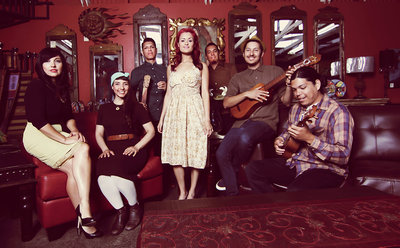
For many Americans, the first introduction to the infectiously happy ditty “La Bamba” was either circa 1958 from the crooning Chicano rocker Ritchie Valens or circa 1987 from a pompadour-ed Lou Diamond Phillips playing the crooning Chicano rocker in the biopic La Bamba.
This Top 40 hit, however, is hundreds of years old.
“‘La Bamba’ is a traditional Son Jarocho song,” Leah Rose Gallegos explains. “It’s been remade by Ritchie Valens, Los Lobos and also us.”
Gallegos is a member of seven-piece L.A. band Las Cafeteras, playing WOW Hall Feb. 4.
The Las Cafeteras version, “La Bamba Rebelde,” from the 2012 album It’s Time, adds lyrics with a contemporary punch — about Arizona’s immigration laws (“contra leyes racistas en Arizona”) and not letting borders divide people — but it is still very much rooted in Son Jarocho, a folk music tradition that originated in the Mexican state of Veracruz.
Gallegos’ bandmate Hector Flores described the music best when the band visited Seattle’s KEXP last year: “It’s basically slave music — a mix of African, indigenous, Spanish, Arabic beats, rhythms and rhymes that kind of coalesced during a time of degradation known as slavery, but out of this time came this very beautiful music that people used to communicate and talk about their surroundings.” He adds, “We’re using this traditional music to tell our stories about kids growing up in L.A.”
Gallegos points to the song “La Guacamaya” as an example. “We would sing this song over and over and over and sing these verses about this bird and one day we were kind of discussing it and said, ‘What is a guacamaya?’ Some of us had never seen one in our life.”
The band decided that, for them, “La Guacamaya” was a symbol for “ghetto birds,” or the helicopters that buzz above the poor neighborhoods of East L.A. “We were rewriting to our own experiences,” Gallegos says.
The goal of Las Cafeteras, Gallegos adds, is to use “storytelling as a tool of empowerment” and encourage others to tell their own stories. Las Cafeteras has been incredibly effective in their mission — NPR has called the music “creative, socially conscious, it’s perfect.”
Perhaps this is because the band’s brand of Son Jarocho is, like “La Bamba,” so infectiously happy and emotive. Gallegos’ voice is a high, richly celebratory siren — it’s uncanny. Part-Apache and part-Yaqui, she learned to sing from Mexican traditional healers, or curanderos. “It was such a blessed introduction to the voice, she says. “I wasn’t so much learning technique or the musicality of it, or the science behind the voice, but I was learning to share the voice as a tool and almost as an offering.”
As she sings, she plays the quijada, a donkey jawbone used for percussion.
“The teeth of the jaw are a little loose so when you hit the side of it, it has a really nice jingling noise,” she says.
Gallegos, like many in the band, also performs a percussive dance — zapateado — on a wooden board. The other six members — Annette Torres, Daniel French, Hector Flores, David Flores, Denise Carlos and Jose Cano — sing and round out the Son Jarocho sound with a marimbol (a percussive instrument), a jarana segunda (an 8-string guitar from Veracruz), a requinto (a small-body guitar) and a cajón (a six-sided percussion box).
Las Cafeteras is gaining a reputation for high-energy live performances. When I bring this up to Gallegos, she laughs.
“I almost feel like the seven of us get somewhat possessed but in a really good way,” she says. “It has a lot to do with our experience of this creative expression through music. I think that itself makes the body and the mind feel really good. I think we get entrapped in the moment of being free.”
Las Cafeteras plays 8 pm Wednesday, Feb. 4, at WOW Hall; $10 adv., $12 door.